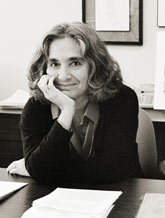
Handy Links
SLAC News Center
SLAC Today
- Subscribe
- Archives: Feb 2006-May 20, 2011
- Archives: May 23, 2011 and later
- Submit Feedback or Story Ideas
- About SLAC Today
SLAC News
Lab News
- Interactions
- Lightsources.org
- ILC NewsLine
- Int'l Science Grid This Week
- Fermilab Today
- Berkeley Lab News
- @brookhaven TODAY
- DOE Pulse
- CERN Courier
- DESY inForm
- US / LHC
SLAC Links
- Emergency
- Safety
- Policy Repository
- Site Entry Form

- Site Maps
- M & O Review
- Computing Status & Calendar
- SLAC Colloquium
- SLACspeak
- SLACspace
- SLAC Logo
- Café Menu
- Flea Market
- Web E-mail
- Marguerite Shuttle
- Discount Commuter Passes
-
Award Reporting Form
- SPIRES
- SciDoc
- Activity Groups
- Library
Stanford
Around the Bay
From the Director: Mentor a Summer Student!

Where did it all start? For most of us doing science today, it started when we were inspired by a great teacher or mentor. Perhaps the mentor was a postdoc, a graduate student, or a senior scientist who influenced the way we do science.
Also, most of us who have gone into science learned about it first in classes and in books. But then we all had to learn that “boots on the ground science” is very different from classes. In my case, even though I had grown up around physicists all my life, my first summer in graduate school was transformational. It was the first time that I worked in a research lab and I saw what it was really like to do science in the lab. I had an excellent mentor (a senior postdoc by the name of Steve Chu) and it really had a huge influence on my physics career.
At SLAC, we have two eight-week summer mentorship programs in science and engineering: the Summer Undergraduate Laboratory Internship and the Science Teacher and Researcher program. Both run from mid-June to mid-August. The goal of these programs is to bring in selected science and engineering undergraduates and a few science teachers to learn science by working on a project under the mentorship of a SLAC scientist or engineer. Typically, these summer students and teachers work on a sub-project of one of the bigger projects at the lab. In the course of working on this project, they learn not only how to do science, but also how to talk, teach and write about it.
The students and teachers who apply to these programs are usually very motivated. They come from a variety of backgrounds. Some have worked in other labs, while others have done very well academically but haven’t had the opportunity to see research first-hand. Attendees are usually a diverse group and SLAC pays special attention to attracting underrepresented minorities into the program and into science. We screen them to make sure that they have the necessary academic background to do a real project at SLAC within the eight week session.
As a result, historically many of the projects have been very successful. Some attendees have turned their projects into papers in peer-reviewed journals. Some have built instruments that we always wanted but didn’t have time to design and build, and others have devised new ways of collecting and analyzing data or written software packages to collect or analyze data in a better or easier manner.
It takes effort and engagement to be a good mentor. If you are going to be away part of the summer, you will have to find a colleague or collaborator to look out for your student while you are gone. However, the rewards can be great. You can have a tremendous influence on the student or the teacher you work with. You can literally influence the future direction that they take with their careers.
If you think you might want to be a mentor and you have a good project, I encourage you to contact someone on the mentor selection committee to learn more. The committee members are Apurva Mehta, David Fritz, Al Baker, James Safranek, Eduardo Do Couto E Silva, Ritimukta Sarangi, and Deborah Bard. Make this summer special—be a mentor!
